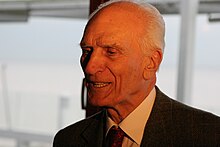Marian Pankowski
Marian Pankowski (born November 9, 1919 in Sanok , Poland ; † April 3, 2011 in Brussels , Belgium ) was a Polish writer , poet , novelist , literary historian and translator .
Life
After attending school in 1938, Marian Pankowski began studying Polish philology at the Jagiellonian University in Krakow . At the beginning of the Second World War he did his military service and fought against the German invasion of Poland . There he was initially taken prisoner of war and later from 1942 to 1945 as a concentration camp prisoner in the concentration camps Auschwitz , Groß-Rosen and Bergen-Belsen .
After his liberation at the end of the Second World War, he settled in Belgium, where he initially worked as a translator in Brussels. He began his literary career in the mid- 1950s and in the following decades wrote books that were partly autobiographical , such as Smagła swoboda (1955), Matuga idzie (1959), Kozak i inne opowieści (1965), Rudolf (1980), Pątnicy z Macierzyzny (1987) and Putto (1994). For the books Z Auszwicu do Belsen (2000) and W stronę miłości "(2001) he was nominated for the Nike Literature Prize, the most important literary prize in Poland, and at the latest thereby became one of the most important contemporary Polish writers.
Pankowski, whose works are characterized by sensitive colloquial language and sometimes rebelliously overcome literary and moral clichés, most recently wrote the books Bal wdów i wdowców (2006), Ostatni zlot aniołów (2007), Była Żydówka, nie ma Żydówki (2008), Niewola i dola Adama Poremby (2009) and Tratwa nas czeka (2010).
Some of his books have also appeared in German translation, such as Matuga geht (Matuga idzie, 1972), Der Kosak und Betty (1985), Planet Auschwitz (2010) and most recently The Last Angel Day (Ostatni zlot aniołów, 2011).
Web links and sources
- Homepage of Marian Pankowski
- Literature by and about Marian Pankowski in the catalog of the German National Library
- Marian Pankowski nie żyje (onet.pl, April 3, 2011)
| personal data | |
|---|---|
| SURNAME | Pankowski, Marian |
| BRIEF DESCRIPTION | Polish writer, poet, novelist, literary historian and translator |
| DATE OF BIRTH | November 9, 1919 |
| PLACE OF BIRTH | Sanok , Poland |
| DATE OF DEATH | April 3, 2011 |
| Place of death | Brussels , Belgium |
